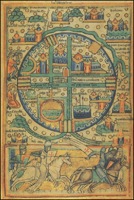Difference between revisions of "Zion"
m (Text replacement - "http://nordan.daynal.org" to "https://nordan.daynal.org") |
m (Text replacement - "http://" to "https://") |
||
| Line 3: | Line 3: | ||
==Origin== | ==Origin== | ||
[https://nordan.daynal.org/wiki/index.php?title=English#ca._1100-1500_.09THE_MIDDLE_ENGLISH_PERIOD Middle English] Sion, from [https://nordan.daynal.org/wiki/index.php?title=English#ca._600-1100.09THE_OLD_ENGLISH.2C_OR_ANGLO-SAXON_PERIOD Old English], [[citadel]] in [[Palestine]] which was the [[nucleus]] of [[Jerusalem]], from Late Latin, from [[Greek]] Seiōn, from [[Hebrew]] Ṣīyōn | [https://nordan.daynal.org/wiki/index.php?title=English#ca._1100-1500_.09THE_MIDDLE_ENGLISH_PERIOD Middle English] Sion, from [https://nordan.daynal.org/wiki/index.php?title=English#ca._600-1100.09THE_OLD_ENGLISH.2C_OR_ANGLO-SAXON_PERIOD Old English], [[citadel]] in [[Palestine]] which was the [[nucleus]] of [[Jerusalem]], from Late Latin, from [[Greek]] Seiōn, from [[Hebrew]] Ṣīyōn | ||
| − | *[ | + | *[https://en.wikipedia.org/wiki/14th_century 14th Century] |
| − | The name ''Tzion'' appears 108 times in the [ | + | The name ''Tzion'' appears 108 times in the [https://en.wikipedia.org/wiki/Tanakh Tanakh] (Hebrew Bible), and once as HaTzion.] It is spelled with a [https://en.wikipedia.org/wiki/Tzadi Tzadi] and not [https://en.wikipedia.org/wiki/Zayin Zayin]. The commonly used form is an adopted mis-transliteration in [[English]] based on the [https://en.wikipedia.org/wiki/Protestant Protestant] German [https://en.wikipedia.org/wiki/Orthography orthography] use, where z is always pronounced [t͡s] (e.g. "zog" [t͡soːk]), hence Tsion in German literature. A tz would only be used if the preceding vowel is short, and hence use of Zion in 19th century German [https://en.wikipedia.org/wiki/Biblical_criticism Biblical criticism] works. This orthography was adopted because in German the correct transliteration can only be rendered from the one instance of HaTzion in Kings II 23:17, where the a vowel is followed by a double consonant tz. |
==Definitions== | ==Definitions== | ||
*1a : the [[Jewish]] people : [[israel]] | *1a : the [[Jewish]] people : [[israel]] | ||
| Line 10: | Line 10: | ||
*3: [[utopia]] | *3: [[utopia]] | ||
==Description== | ==Description== | ||
| − | '''Zion''' (Hebrew: ציון; Tiberian vocalization: Ṣiyyôn; transliterated Tzion or Tsion) is an erroneously transliterated term that most often refers to [[Jerusalem]] and, by extension, sometimes to the Biblical land of [[Israel]]. The [[word]] is first found in Samuel II, 5:7 dating back over two and a half millennia. In [ | + | '''Zion''' (Hebrew: ציון; Tiberian vocalization: Ṣiyyôn; transliterated Tzion or Tsion) is an erroneously transliterated term that most often refers to [[Jerusalem]] and, by extension, sometimes to the Biblical land of [[Israel]]. The [[word]] is first found in Samuel II, 5:7 dating back over two and a half millennia. In [https://en.wikipedia.org/wiki/Kabbalah Kabbalah] the more [[esoteric]] reference is made to Tzion being the [[spiritual]] point from which [[reality]] emerges, located in the [https://en.wikipedia.org/wiki/Holy_of_Holies Holy of Holies] of the First, [https://en.wikipedia.org/wiki/Second_Temple Second] and [https://en.wikipedia.org/wiki/Third_Temple Third Temple]. It commonly referred to a specific [[mountain]] near [[Jerusalem]] ([https://en.wikipedia.org/wiki/Mount_Zion Mount Zion]), on which stood a [https://en.wikipedia.org/wiki/Jebusite Jebusite] [[fortress]] of the same name that was [[conquered]] by [https://en.wikipedia.org/wiki/David David] and was named the [https://en.wikipedia.org/wiki/City_of_David City of David]. |
| − | The term ''Tzion'' came to designate the area of [[Jerusalem]] where the [[fortress]] stood, and later became a metonym for [ | + | The term ''Tzion'' came to designate the area of [[Jerusalem]] where the [[fortress]] stood, and later became a metonym for [https://en.wikipedia.org/wiki/Solomon Solomon]'s [https://en.wikipedia.org/wiki/Temple_in_Jerusalem Temple in Jerusalem], the city of Jerusalem and generally, the [https://en.wikipedia.org/wiki/Olam_Haba Promised Land to come]. According to the [[Hebrew Bible]], [[God]] dwells among his people in [[Israel]].[https://en.wikipedia.org/wiki/Zion] |
[[Category: Religion]] | [[Category: Religion]] | ||
Latest revision as of 02:41, 13 December 2020
Origin
Middle English Sion, from Old English, citadel in Palestine which was the nucleus of Jerusalem, from Late Latin, from Greek Seiōn, from Hebrew Ṣīyōn
The name Tzion appears 108 times in the Tanakh (Hebrew Bible), and once as HaTzion.] It is spelled with a Tzadi and not Zayin. The commonly used form is an adopted mis-transliteration in English based on the Protestant German orthography use, where z is always pronounced [t͡s] (e.g. "zog" [t͡soːk]), hence Tsion in German literature. A tz would only be used if the preceding vowel is short, and hence use of Zion in 19th century German Biblical criticism works. This orthography was adopted because in German the correct transliteration can only be rendered from the one instance of HaTzion in Kings II 23:17, where the a vowel is followed by a double consonant tz.
Definitions
Description
Zion (Hebrew: ציון; Tiberian vocalization: Ṣiyyôn; transliterated Tzion or Tsion) is an erroneously transliterated term that most often refers to Jerusalem and, by extension, sometimes to the Biblical land of Israel. The word is first found in Samuel II, 5:7 dating back over two and a half millennia. In Kabbalah the more esoteric reference is made to Tzion being the spiritual point from which reality emerges, located in the Holy of Holies of the First, Second and Third Temple. It commonly referred to a specific mountain near Jerusalem (Mount Zion), on which stood a Jebusite fortress of the same name that was conquered by David and was named the City of David.
The term Tzion came to designate the area of Jerusalem where the fortress stood, and later became a metonym for Solomon's Temple in Jerusalem, the city of Jerusalem and generally, the Promised Land to come. According to the Hebrew Bible, God dwells among his people in Israel.[1]
